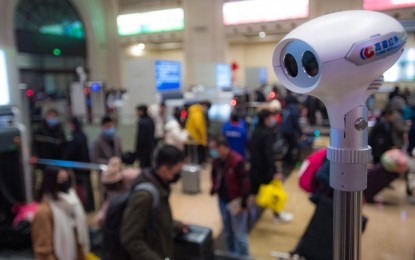News
Solons urge temporary China travel ban amid nCoV scare

FILE: Photo taken on Jan. 22, 2020 shows a thermal detector at Hankou Railway Station in Wuhan, capital of central China’s Hubei Province. (Xinhua/Xiao Yijiu via PNA)
MANILA — Following confirmation of the first case of novel coronavirus (2019-nCoV) in the country, several senators on Thursday called on the government to impose travel restrictions on all travelers coming from, or have passed through, China to deter the spread of the virus.
Senate President Pro-Tempore Ralph Recto said it is time to put a temporary “Do not enter” sign at the country’s doorsteps for visitors from China.
“Let us explain to them that we are not permanently closing our doors. This is not a permanent Great Wall. This is only during the duration of the coronavirus crisis,” Recto said in a statement.
The move, he said, is consistent with what China is doing to stave off the spread of the virus, noting that even within China, its government has quarantined 40 million of its people, confining them in their homes and restricting their travel.
“If many of their people are not allowed to travel from Point A to B in China, then why are we allowing travel from most points in China to all points in the Philippines?” he said.
“When China sneezes, we get pneumonia. If that is the case, then an ounce of border control is worth a ton of cure,” Recto said.
In a separate statement, Senator Risa Hontiveros said the temporary travel ban should be at least 30 days, and must firmly include both air and sea travel to prevent a local outbreak.
“This includes a temporary ban on all cruise ships from docking at any of our ports,” she said.
“This temporary travel ban will give time for our health authorities to set in place all safeguards necessary in case there is more confirmation of the 2019-nCoV presence in the country from those under present surveillance,” Hontiveros said.
Meanwhile, Senator Joel Villanueva said the government must now prioritize the safety and security of our people over other considerations and impose the travel restrictions.
He also urged the public to follow health protocols to ensure their safety.
“We call on our fellow kababayans here in the Philippines to follow safety precautions and avoid crowded places for now. We also dissuade them against circulating fake news on social media, which tends to incite people to fear and panic,” he said in a statement.
He also urged we ask the health department to intensify its information dissemination campaign, and ensure that our health facilities are properly equipped to handle the spread of this virus.”
Earlier, health authorities confirmed that a 38-year-old Chinese woman from Wuhan, China, who arrived in the Philippines on January 21, is infected with the novel coronavirus following a laboratory test in Australia.
Some 23 other individuals in various hospitals are still under investigation for the virus, while five have been discharged but are under strict monitoring.
The 2019-nCoV has claimed the lives of at least 170 in mainland China and infected nearly 8,000. Cases of the virus have also been confirmed in several countries in Asia, Europe, North America, and the Middle East.
According to the World Health Organization, its symptoms include fever, cough, and shortness of breath.
To prevent infection and spread the disease, health authorities recommend everyday preventive actions like frequent washing of hands; use of hand sanitizer; avoiding touching of eyes, nose, and mouth with unwashed hands; and avoiding close contact with people who are sick, among others.





















